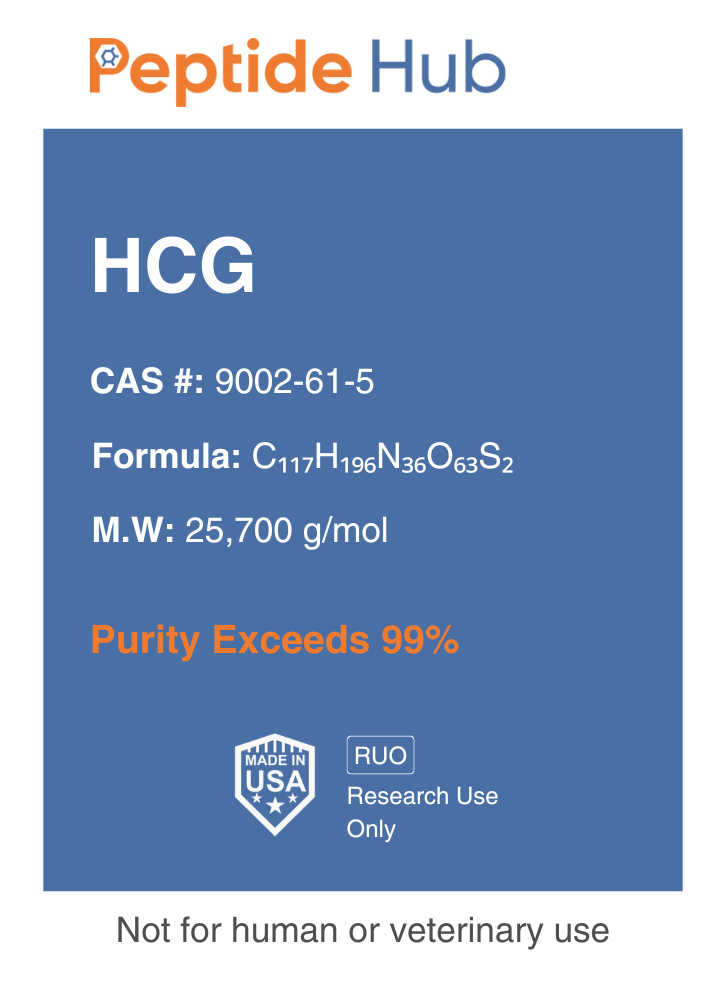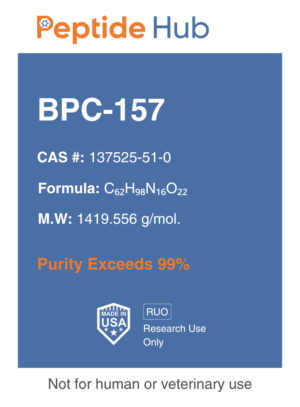HCG
$75.00

HCG – 5mg
HCG (Human Chorionic Gonadotropin) is a hormone naturally produced during pregnancy that is widely recognized for its role in fertility treatments and weight management research. In addition, HCG has gained popularity for its potential in supporting weight loss by promoting fat metabolism while preserving lean muscle mass, particularly when used in conjunction with a low-calorie diet as seen in studies.
Buy HCG, it may help regulate the body’s use of fat as an energy source, making it appealing for researchers studying body fat while maintaining muscle.
Research Peptides
99% Purity
3rd Party Tested
USA Made
Note: Peptides will arrive in a lyophilized (powder) form for maximum stability
The peptides are available for research and laboratory purposes only. Please review and ahere to our Terms and Conditions before ordering.
- Description
- Certificate of Analysis
What is HCG?
Human Chorionic Gonadotropin (HCG) is a hormone naturally produced during pregnancy by the placenta. In the research field, synthetic or purified forms of HCG are used in studies related to fertility, weight loss, and hormone regulation. It is commonly associated with stimulating ovulation in women and increasing sperm production in men. HCG has been a subject of research in various fields such as reproductive health, hormonal balance, and metabolic function.
The Origin of HCG
HCG was first identified in the early 20th century as a hormone produced by the placenta during pregnancy. It plays a crucial role in maintaining the production of progesterone, which is essential for the early stages of pregnancy.
HCG’s Unique Composition
HCG is a glycoprotein hormone composed of two subunits, alpha and beta. It mimics the effects of Luteinizing Hormone (LH) in the body, making it useful in fertility treatments for stimulating ovulation and increasing sperm production. HCG’s ability to promote the production of other essential hormones is what makes it a key subject of research in reproductive medicine and endocrinology.
Mechanism of Action
HCG works by mimicking the function of LH, a hormone that stimulates the production of sex hormones in both men and women. In women, it helps trigger the release of an egg during ovulation, while in men, it stimulates the production of testosterone, which can aid in sperm production. Its hormone-regulating properties have made HCG a target for research into fertility treatments and hormonal research.
Hormonal Balance and Reproductive Health
Due to its ability to regulate sex hormones, HCG is widely studied for its role in treating infertility and other reproductive issues. It is commonly used in conjunction with other hormones to promote ovulation or improve sperm count, making it a valuable tool in assisted reproductive technology (ART).
HCG for Fertility Treatments
HCG is extensively researched in the context of fertility treatments for both men and women. In women, it helps induce ovulation, which is essential for conception. In men, it stimulates the testes to produce more testosterone, which can increase sperm production, making it a vital part of infertility treatments.
Potential Role in Weight Loss
HCG has gained popularity in certain weight loss programs, although its effectiveness is still under debate. Some studies suggest that HCG may help regulate metabolism and reduce appetite, but more research is needed to fully understand its potential in this area.
Why HCG is Different from Other Hormonal Treatments
HCG is unique in its dual role in both reproductive health and hormone regulation. HCG’s ability to mimic LH and stimulate the production of key reproductive hormones allows it to address multiple issues related to fertility and hormonal balance in research.
For Research Use Only
No Certificate of Analysis images available for this product.











